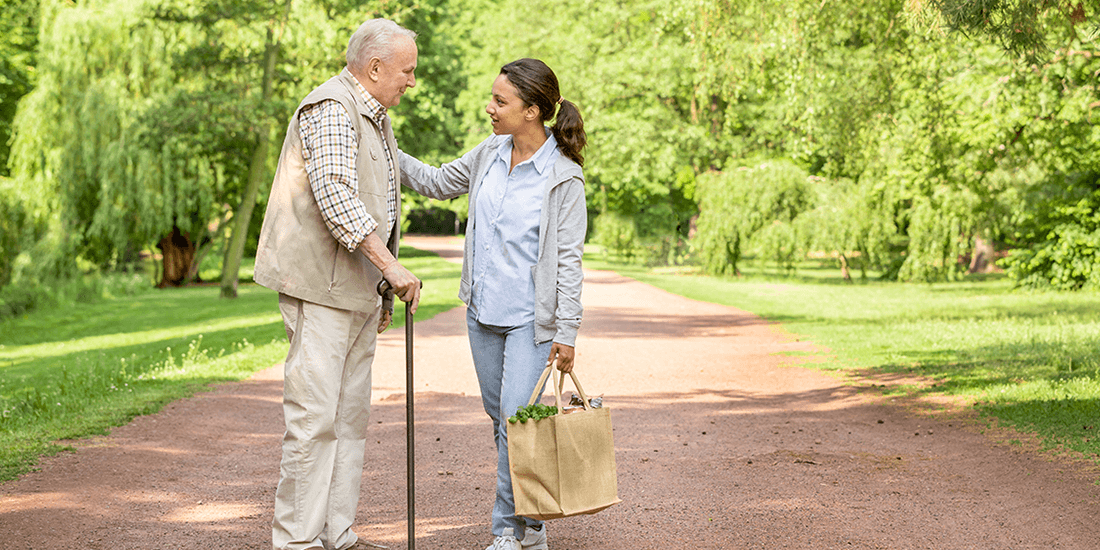
Physical activity, healthy eating and social interaction help to preserve quality of life – also for people with dementia.
Even though you have a dementia disease, you can still live an active life. Content in everyday life is important for your well-being. Continuing to do the things that you enjoy is therefore also healthy – even if you need help to do them. With the right support from family and any caregivers, it is possible to remain active even as the disorder gets worse
In this article you can read about:
Instead of starting completely new interests, it is often better to keep doing what the person with dementia is already familiar with and fond of. Even though these interests can become too difficult or completely impossible to do without help. For example, it can be difficult to continue playing tennis without help to remember clothes and rackets and help finding the way to the changing rooms and the right court.
It is also often possible to simplify an activity so that the person with dementia can manage without help. This is good for self-esteem. For example, if the person with dementia is used to playing bridge, perhaps they can play another less demanding card game instead.
People with dementia are usually also happy if they can continue to perform simple, everyday tasks such as washing up, cooking, putting laundry away, watering plants, doing handicrafts or weeding the garden. If the tasks are simple and routine, they can often be carried out alone – perhaps at a slightly slower pace. It is not certain that the result will be quite like it used to, so expectations should be dampened a little. The important thing is that the person with dementia finds pleasure in the activities.
More information: Aids for people with dementia.
Music, song and dance
Most dementia disorders affect memory in particular and the ability to think abstractly. Many also experience language difficulties. However, the enjoyment of music, singing and dancing does not disappear. The majority of people with dementia can remember melodies and lyrics with little difficulty, even if they forget many other things. Many people with dementia are still able to play an instrument even as they become worse, if they learned to play it before the dementia began.
Music, song and dance can therefore be really important to people with dementia. For the person with dementia, hearing their favourite music or having the radio tuned to the station they like brings happiness and reassurance. However, be aware that music and singing can disturb concentration during conversations and meals.
More information: Communicating with people with dementia.
Keeping active can prevent health problems, increase physical and psychological well-being and lead to a better appetite. Problems with reversing the circadian rhythm and poor sleep at night can also decrease if you are physically active.
Therefore, if the person with dementia is accustomed to running, walking, cycling, swimming or other sporting activities, it is a good idea to support the activities as long as they are safe. Even if the person with dementia has not been used to being active, it is never too late to start. You can start with short walks so that they get some fresh air and a little exercise, preferably every day. Following the same route with some easily recognisable reference points is good. It is easier for people with dementia to remember reference points such as “turn left by the house with the blue door” than it is to remember street names and distances. The walk becomes more enjoyable and can help to ensure that the person with dementia continues to get out and about and socialise as long as a relative or volunteer keeps them company on the walk. Having company may also help the person with dementia to get their pulse up.
Most towns and cities have training classes for the elderly, but be careful that not to overwhelm them with new activities or new places. A doctor can provide advice if the person has problems with knees, hips or other joints which hinder physical activity.
People with dementia may find it difficult to feel hunger and therefore forget to eat. The illness may also make it difficult to do the cooking yourself.
If you eat too little or the wrong things, you may end up lacking important vitamins and nutrients. This has a negative effect on your energy levels and health. Perhaps planning meals and helping with the shopping or getting the items delivered will help. You can also register for the municipality’s meals service, so precooked food is brought to your home. Regardless of who prepares the food, it is important to get enough calcium and perhaps also a vitamin D supplement to prevent osteoporosis. People with dementia have an increased risk of falling, and if they also suffer from osteoporosis, this is a dangerous combination.
In addition to eating correctly, it is also very important to drink enough fluids. Many elderly people, whether they have dementia or not, forget to drink enough because they do not feel thirsty. If you become dehydrated, you may get constipation, feel uncomfortable and become dizzy. Many people find that a schedule showing how much they have drunk during the day helps. Rice, vegetables, fruit, full grain and fibres, plenty of fluids and daily exercise can help prevent constipation.
People with dementia may also forget to take their medication, especially if they take different kinds of medications at different times during the day. Ask your pharmacist for help. You can compartmentalise the medication so it is easy to know which medication to take and when to take it.
Otiom prevents persons with dementia from getting lost
-?